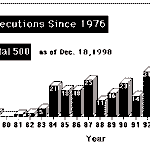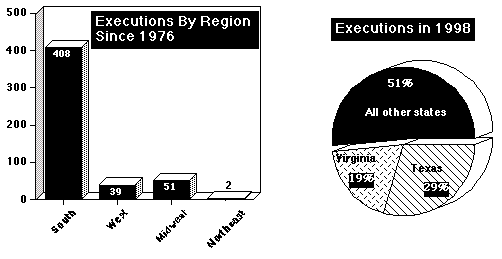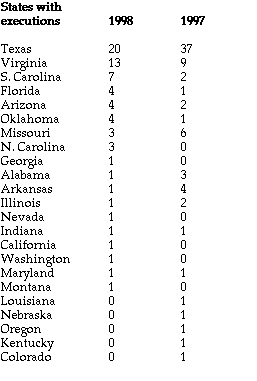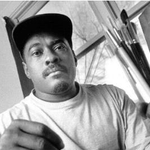The Death Penalty in 1998: Year End Report
Posted on Dec 18, 1998
- New Voices Raise Dissent, Executions Decline
- Executions Remained a Regional Event
- Juveniles, Mentally Retarded, and Foreign Nationals Executed
- Race and Representation
- Karla Faye Tucker's Execution Draws Protest
- New Voices of Opposition
- International Concern Continues to Grow
- Innocence
- Persons Executed This Year
- Conclusion
New Voices Raise Dissent, Executions Decline Top
The number of executions in 1998 declined slightly from the record number in 1997. As of December 18, there were 68 executions in the U.S., down from 74 people executed last year (no more are scheduled this year). About half of the executions occurred in two states: Texas and Virginia. The total number of executions in the U.S. since 1976 reached 500. The number of people on death row again moved to a record high and now stands at 3,517, though the Bureau of Justice Statistics reported a 19% drop in new death sentences in 1997.
The year was marked by unusual events which prompted criticism of the death penalty from new sources. Judges, former prosecutors, conservative religious leaders and international diplomats all found fault with capital punishment in the U.S. this year. And the prospect of innocent people being sent to their deaths was dramatically brought to the public’s attention by a national gathering of those who have been freed from death row.

Executions Remained a Regional Event Top
Eighty-one percent of the executions this year occurred in the South. Texas again led the country with 20 executions. Virginia had the second largest number with 13. On a per capita basis, Virginia surpassed Texas, even though its death row is only one-tenth the size of Texas’s. More than half (20) of the states with the death penalty, and the federal government, had no executions this year.

Juveniles, Mentally Retarded, and Foreign Nationals Executed Top
Despite strong opposition from national and international human rights leaders, three juvenile offenders were executed this year, two in Texas and one in Virginia, the first such executions since 1993. Virtually all of the other countries in the world refrain from executing those who were under 18 at the time of their crime. Two men suffering from mental retardation were executed this year. Four foreign nationals were also executed this year, three of whom challenged that they were not informed of their rights under the Vienna Convention to consult with their consulate at the time of their arrest.
Race and Representation Top
Race again played a decisive role in who lives and who dies. Of the 68 executions this year, only 11 (16%) involved the murder of a black victim, even though blacks are the victims in 50% of all murders. The Death Penalty Information Center released a report based on an exhaustive statistical study of capital cases in Philadelphia, which showed that for similar crimes the odds of blacks receiving the death penalty were four times greater than for any other defendants. The report also revealed that 98% of the nation’s chief district attorneys responsible for death penalty decisions are white, while only 1% are African American. Many members of the Congressional Black Caucus joined in condemning the discriminatory application of the death penalty.
Although some states took efforts to improve their system of capital representation for the poor, the overall picture remained dismal. In almost three years, not a single state has been qualified as providing adequate representation for death row inmates under the Anti-Terrorism and Effective Death Penalty Act of 1996. This law provides for a faster appeals process in exchange for improved representation, but states have not matched their professed desire for streamlined federal review with a commitment of resources to assure a thorough review. In Alabama, the legislature approved raising the abysmally low fee of $20 per hour for trial preparation in capital cases, but the measure was vetoed by Governor Fob James. In Mississippi, the state Supreme Court declared that indigent death row inmates are entitled to representation, but the legislature has not approved a single dollar to implement that ruling.

Karla Faye Tucker’s Execution Draws Protest Top
The execution of a woman in February brought the most attention to the death penalty this year. Karla Faye Tucker was the first woman executed in the U.S. in almost 14 years. (A second woman, Judi Buenoano, was electrocuted a month later in Florida.) Despite pleas for mercy from the Pope, Rev. Pat Robertson, family members of the victims and other world leaders, Texas Governor George Bush declined to stay the execution. A poll in Texas taken shortly after the execution showed a drop of 18 percentage points in support for the death penalty.
This execution prompted a re-evaluation of Texas’s clemency process, a proposal to adopt a sentencing alternative of life-without-parole in Texas, and a widespread examination of whether the death penalty makes sense when non-threatening individuals are executed years after their crime. For many people the image of the death penalty now bears the face of Karla Faye Tucker, and it is a disturbing image.

New Voices of Opposition Top
In addition to the calls for mercy from death penalty supporters such as Pat Robertson and Jerry Falwell, a number of other new voices emerged this year:
- In Florida, the Chief Justice of the Supreme Court and former homicide prosecutor, Gerald Kogan, said: “It doesn’t make any difference if you are in favor of capital punishment or if you are opposed to capital punishment. The fact of the matter is that as a viable penalty, capital punishment does not work at this time and has not worked in the State of Florida for many, many, many years.” After noting the enormous amount of time the courts devote to these cases, and the high financial costs of the death penalty compared to life without parole sentences, he said, “We have to ask ourselves if it is not time for us to rethink whether or not capital punishment is a viable remedy for the crime of first-degree murder.“1
- In Illinois, Justice Moses Harrison II of the state’s Supreme Court concluded that the high risk of executing the innocent undermines the entire justice system: “Despite the courts’ efforts to fashion a death penalty scheme that is just, fair, and reliable, the system is not working. Innocent people are being sentenced to death.… It is no answer to say that we are doing the best we can. If this is the best our state can do, we have no business sending people to their deaths.” 2
- Former U.S. Court of Appeals Judge Abner Mikva also found the death penalty to be failing its test: “Despite many efforts to do so, it has proven almost impossible to quantify the efficacy of capital punishment,” he wrote. “The main function of the death penalty is to vent spleen against those who commit certain crimes .…[resulting] in harm to the justice system that is not always apparent.” 3
- Judge Rudolph Gerber of the Arizona Court of Appeals changed his mind about the death penalty after years of observation: “To support the death penalty as sound social policy strikes me as grossly misguided. Not only does the death penalty not deter murder, it fosters a culture of brutality, risks international condemnation, and transforms our country into a brutal pariah.” 4
- In Virginia, former Attorney General William Broaddus, who helped steer the state toward its prominence in executions, changed his mind and now opposes the death penalty: “There’s just no way I could conclude that the way we do this makes any sense. I have come to conclude that, in fact, we apply the death penalty in a very arbitrary manner.” 5
- Former Texas Attorney General Jim Mattox pushed the Governor to one of the most unusual events in recent death penalty history: a commutation in Texas. Mattox’s investigation into the multiple confessions of Henry Lee Lucas led him to conclude that Lucas was about to be executed for a crime he did not commit. Lucas, who claimed to have killed 500 people, became the only person in the country granted clemency this year.
- Two of the prominent newspapers in the leading death penalty states editorialized against the way the death penalty is applied. The Virginian-Pilot6 The Dallas Morning News, in a series of editorials, decried the poor system of representation offered defendants and called upon the state to stop the execution of the mentally impaired, which it called “pointless” and “immoral.” 7 changed its editorial stance and now opposes the death penalty because “despite lawmakers’ and courts’ best efforts, decisions as to who dies and who lives hinge regularly on matters having little to do with guilt or innocence. All too frequently, the determining factors are quality of legal representation, personal wealth of the defendant, race of either the victim or the alleged perpetrator and even the politics of those charged with prosecution.”
International Concern Continues to Grow Top
- For the first time, the International Court of Justice at the Hague asked that an execution in the U.S. be delayed, because a Paraguayan defendant’s rights under the Vienna Convention had been violated. The World Court’s request, along with a plea from Secretary of State Madeleine Albright, was rejected by the U.S. Supreme Court and the state of Virginia, and Angel Breard was executed on April 14.
- A similar battle arose over the execution in Texas of Canadian citizen, Joseph Faulder. The Foreign Minister of Canada, Madeleine Albright, the UN High Commissioner for Human Rights, the President of the European Union, and Bishop Tutu of South Africa all called on Texas to stop this execution, but to no avail. A half hour before his execution, the U.S. Supreme Court granted a stay. Not only was Faulder not informed of his consular rights, he also merited clemency because of serious brain damage at an early age.
- The United Nations Commission on Human Rights, meeting in Geneva in April, called for a moratorium on all executions. The resolution was co-sponsored by 63 nations. The U.S. was one of the few countries to oppose it, along with such countries as Bangladesh, China, South Korea and Rwanda.8
- The United Nations Special Rapporteur on Extrajudicial, Summary or Arbitrary Executions delivered his report following his first visit to this country. He found a “significant degree of unfairness and arbitrariness” in the U.S. death penalty, and particularly faulted the execution of juvenile offenders and the mentally retarded.9
The religious community was also vocal in opposition to the death penalty in 1998. The entire Texas Conference of Churches called for an end to the death penalty. Catholic bishops in many states, and the Leadership Conferences of Women and Men Religious, repeatedly criticized the death penalty and called for an immediate moratorium on executions.

Innocence Top
In November, a unique gathering of people who had been sentenced to die and then released from death row in the past 25 years took place in Chicago. Thirty of the 75 people who were freed after evidence of their innocence emerged were present, along with legal experts, activists and media representatives from around the world. The Conference put a human face on one of the most troubling aspects of the death penalty: that it carries an unacceptable risk of executing the innocent. The voices of those who came close to execution were unanimous in saying that the system had failed them. Instead of the normal appeals process, the stories of their freedom were stories of heroic efforts by volunteer lawyers and the media, of scientific advances such as DNA, and of continued resistance by the state even in the face of overwhelming evidence of innocence.
Persons Executed This Year Top
As usual, the stories of many of the people who were executed this year illustrate the unpredictable nature of the death penalty. Among those killed were:
- Thomas Thompson was executed in California on July 14. The U.S. Court of Appeals for the Ninth Circuit had stopped an earlier execution date and reversed his conviction because of ineffective assistance of counsel. The U.S. Supreme Court, however, overturned the appellate court’s decision because, it said, the Ninth Circuit had acted too late. This represented one of many “triumphs” this year of legal process over the substance of a man’s life.
- Zane Hill was executed in North Carolina on August 14 for the murder of his son during a bout of drunken anger. Gov. Jim Hunt, who has never commuted a death sentence, said, “I am deeply sorry for Zane Hill’s family, which has suffered so much violence and heartache as a result of his actions.…“10 The victim’s family asked the governor to commute Hill’s sentence, but to no avail. James Exum, a former chief justice of the state Supreme Court, also asked the governor for clemency. The prosecution had originally offered Hill a plea to second degree murder.
- Jeremy Sagasteui was executed in Washington State on October 13 without having had any adversarial hearing of whether he was guilty or deserved a death sentence. At his trial, Sagasteui acted as his own lawyer and never presented a defense or put on any mitigating evidence to avoid the death penalty. He waived his right to appeal and fought his mother’s attempts to show that he was mentally incompetent. The clemency board split 2 – 2 on recommending mercy, thereby allowing this Kervorkian-like execution to go forward.
- Similarly, Daniel Remata, who was executed in Florida, was attracted to the state to commit murder because it imposes the death penalty. He refused to appeal. Robert Smith killed a fellow prisoner in Indiana because he wanted to go to death row. He turned down a 50-year sentence and was eventually executed. Ricky Lee Sanderson dropped his appeals and chose the gas chamber for his execution in North Carolina. Roderick Abeyta wrote to a Nevada judge asking to be executed. In all, a total of 11 inmates dropped their appeals so that their executions could go forward.
- Dwayne Allen Wright was executed in Virginia on October 14. Wright was 17 years old at the time of his crime, the product of a failed system of juvenile care in the District of Columbia. Wright had been admitted to St. Elizabeth’s mental hospital and lived at two of the city’s most notorious juvenile centers. He suffered from a number of mental problems and grew up with his father incarcerated, his mother suffering from mental illness, and an older brother who served as his father until he was murdered when Wright was ten. Wright’s case captured the attention of noted civil rights, religious and political leaders, but no mercy was shown. Wright was the first juvenile offender executed in Virginia since the death penalty was reinstated. Two other juvenile offenders, Joseph Cannon and Robert Carter, were executed in Texas.
- Tuan Nguyen was executed in Oklahoma on December 10, the 50th anniversary of the UN Universal Declaration of Human Rights. Nguyen was a Vietnamese refugee and a foreign national, with no country to offer him help upon his arrest in 1982. He was convicted of killing his wife and two children of a relative. His attorneys reported a complete inability to communicate with him over the past nine years, despite numerous attempts. A visiting psychiatrist was unable to persuade him to leave his cell and tentatively concluded that Nguyen was suffering from a degenerative neurological disease with cognitive impairment. Despite claims that he was incompetent to be executed, the Supreme Court refused, by a vote of 5 – 4, to stay his execution.
Conclusion Top
As executions remain at a high level, concerns about the death penalty continue to grow. With the exception of politicians, U.S. leaders in the fields of religion, human rights, the law, and diplomacy are increasingly voicing their opposition to the way the death penalty is applied in this country. The execution of juveniles and the mentally retarded, executions that damage U.S. standing in the international community and executions of those who have dramatically turned their lives around, together with the ever-present chance of mistaken executions, have led more and more people to protest the continued use of the death penalty. New voices of criticism, including those of respected appellate judges, former attorneys general, and institutions which formerly supported the death penalty, are being heard as the persistent arbitrariness and unfairness of capital punishment become ever more apparent.
1. M. Killian, Chief Justice Shares Parting Thoughts with Judges, Flordia Bar News, July 15, 1998, at 6.
2. People v. Bull, (Ill. Sup. Ct., Nov. 10, 1998) (Harrison, J., concurring in part and dissenting in part).
3. A. Mikva, Venting the Societal Spleen on the Death Penalty, Conn. Law Tribune, Mar. 9, 1998.
4. R. Gerber, Death is Not Worth It, 24 Litigation 3, (Spring, 1998).
5. L. LaFay, Change of Heart, The Virginian-Pilot, May 24, 1998, at Commentary 1.
6. Virginian-Pilot Editorial, Oct. 19, 1998.
7. Dallas Morning News Editorial, Nov. 22, 1998.
8. Resolution, E/CN.4/1998/L.12 (Mar. 30, 1998).
9. New York Times, April 7, 1998.
10. J. Neff, Plea Denied, Execution Proceeds, Raleigh News & Observer, Aug. 14, 1998.